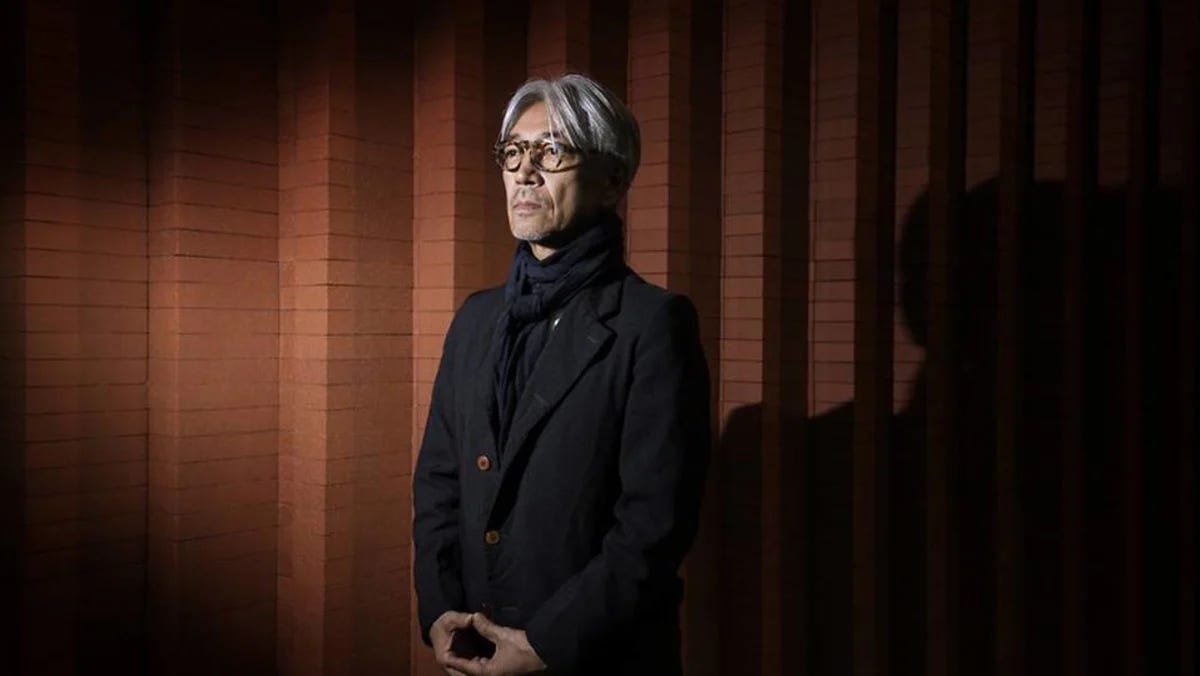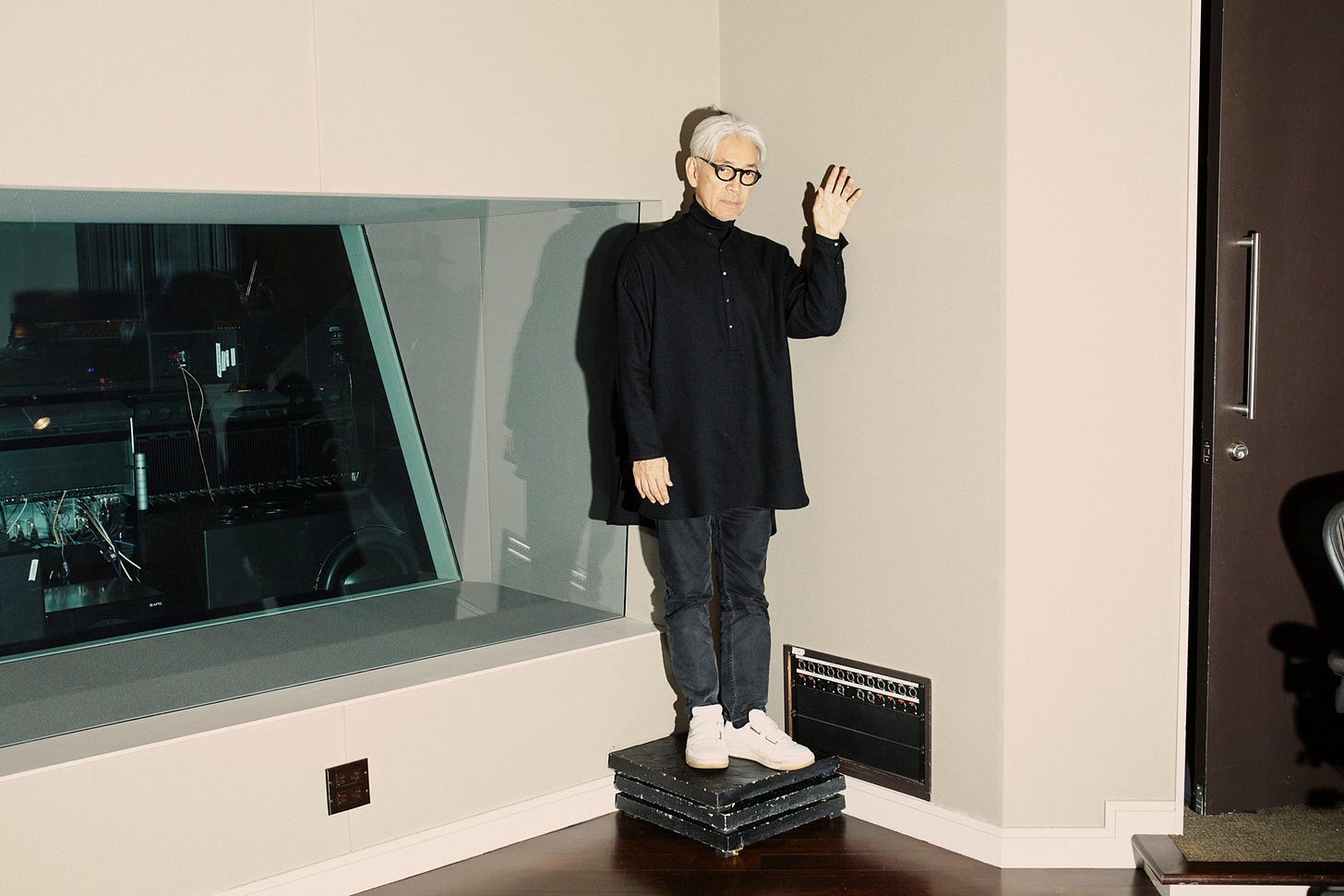When We Remember To Be Alive
In praise of the late award-winning composer, Ryuichi Sakamoto.
Yesterday, in the quietude of another fading morning, I learned that Ryuichi Sakamoto, the Grammy and Oscar-winning composer whose music has cradled many of my joys and pains, has passed away. In the wake of this loss, I want to honor him by extending to you the very gift he bestowed upon me: an invitation to truly be alive.
In the endless noise that is modern existence, our lives often unfold with an urgency that seems to have been prescribed to us by the gods. So many of us often find ourselves hurtling through the days and nights, consumed by the relentless pursuit of success, wealth, social standing, and fleeting happiness. We are, it seems, forever running toward the horizon, seeking elusive things that many would not recognize if they found. And yet, in this relentless race, we often fail to heed the whispers of wisdom that the wind carries to us reminding us to appreciate being here.
Ryuichi Sakamoto was one of those wise whispers.
Sadly, yesterday, the earth spun a little slower, and the sun rose with an unexpected heaviness at the news of Mr. Sakamoto’s passing from colon cancer. My universe in particular seemed to hold its breath for a moment, acknowledging the loss of the great artist who had the uncanny ability to help me slow down, to relinquish time’s grasp on me, and to understand that taking a moment to breathe is not a rejection of progress, but rather an embrace of a more profound understanding of life.
For those unfamiliar with Mr. Sakamoto, he first rose to prominence as a member of the Yellow Magic Orchestra and later became even more known once his first major film score, Merry Christmas, Mr. Lawrence, was released in 1983. He went on to be nominated for and win multiple Grammy Awards, Oscars, and Golden Globes for his work on films such as The Last Emperor and The Revenant (a favorite of mine).
In my opinion, the best way to describe Mr. Sakamoto’s music is to say it gives the gift of reflection, art that stands as a testament to the essential role that introspection plays in shaping our collective destinies.
Unlike many, my own journey to find Mr. Sakamoto was not through the medium of film but rather through the pixelated world of video games. As a twelve-year-old, I was enamored with the beautiful, nature-filled settings and the unforgettable music of the Final Fantasy series, composed by the talented Nobuo Uematsu. The music was so powerful that it would lead me to abandon the game’s missions and make my characters wander aimlessly, just to listen and immerse myself in the score of the game.
It was during those formative years that I began to truly recognize the emotional depth that could be conveyed through melody and harmony, and how those elements could transport me to another world, or evoke feelings I didn't even know I possessed. My appetite for Japanese composers became voracious, and soon I found myself exploring the works of other artists in the genre, always searching for that same emotional connection I had found with Uematsu's music.
And then, one fateful day, I stumbled upon the work of Ryuichi Sakamoto. I cannot recall the exact day or my age, but whenever it was, it helped bring more of the feeling of being alive into my life. His album titled 1996 was the beginning, and one song, "Bibo No Aozora," became a constant companion, a soft place to land during life's many transitions.
I remember listening to that song for the first time, feeling as though I had discovered a hidden treasure, a secret that only I was privy to. The delicate piano notes seemed to speak directly to my soul, and the lush orchestration that accompanied it felt like a warm embrace. I knew, at that moment, that I had found something truly special, and that Ryuichi Sakamoto's music would become an integral part of my life's soundtrack.
As the years went by, his music accompanied me through the various stages of my life, offering solace, inspiration, and a connection to something greater than myself. It carried me through my adolescence, providing a refuge from the pain of being bullied, and a reminder that there was still beauty to be found in the world, even in the darkest of times. As a young adult, I found myself returning to Sakamoto's music again and again, as it became a source of comfort and reassurance during the tumultuous process of self-discovery and personal growth.
More recently, I found connection with my wife, Porsche, through our shared love of his and similar works. I remember our first time sitting together, listening to a myriad of his songs, and the feeling of knowing music such as his had weaved some of the thread that binds us together.
And just weeks before his passing, I found joy as an author completing my first novel to the gentle notes of his piano. The soft sounds of his genius had been a co-author on over four of my published books, and now served as the backdrop to one of my proudest creative achievements. Giving me the latitude to take in the world around me and reimagine it in the fictional world I was building on page.
The news of Mr. Sakamoto's death shook me to my core, and I found myself struggling to process the loss of someone who had played such a significant role in my life, despite never having met him in person. As I sat in my living room, listening to his music, I suddenly began staring at a tree standing outside my living room window, its white flowers blooming, signaling the change of seasons.
Porsche had brought the tree up earlier in the day, before the news had found me, asking whether I noticed it blooming. I told her I had noticed, but not given it much thought. This tree was, after all, a frequent sight in New York City, and as such, not worthy of much attention. Yet, as the notes of Mr. Sakamoto's music filled the air, gently weaving their way into my consciousness, the tree began to demand my regard.
Compelled by a sudden curiosity, I turned to Google, to learn more about the tree. A callery pear tree, it informed me, one of the most common species in New York City. Yet, as I gazed upon the images of its delicate ivory blooms and the fallen petals that lay like fresh snow on the pavement below, I had trouble reconciling how just minutes before, the tree was mundane, yet now one so deeply beautiful.
In an instant, my imagination filled with wonderment at the memories and moments of countless New Yorkers these trees must have been a silent witness to. A silent witness to my own joy, creativity, love, and now, grief.
This is the power of Mr. Sakamoto’s music, the ability to simply still a person, to bid you to pause and to perceive the life unfolding in your peripheral. And so it was that in grieving his death, I found myself in awe of the tree’s life, its white petals quivering softly in the morning breeze, its branches offering respite to the weary birds that landed there.
Once again, his music helped me find the frequency I needed to truly see and appreciate the life that danced around me, and it was in his absence that I’m discovering my depth of gratitude for his gift to the world. In the shadow of the callery pear tree, amidst the tender blossoms swaying in the wind, I was reminded once more of the beauty that waits for us to pause and bear witness.
We have been conditioned to believe that speed is synonymous with progress, that a life lived in haste is a life well-lived. But as we take in the world around us, as we cast our gaze upon the brilliant mess that is our human existence, we must pause and consider the wisdom of our now ancestor, Mr. Sakamoto, who understood the virtue of stillness and the importance of deliberate contemplation. For it is only in the calm of such moments that we may truly appreciate the poetry that lies hidden within the seemingly mundane.
For in the end, it is how we were alive that will serve as one of the best judgments for the legacy of our lives. A lesson I’m largely thankful to have learned from the incredible gift of Ryuichi Sakamoto's music. And for that, I am eternally grateful.
Some of my favorite Ryuichi Sakamoto songs:
Bibo No Aozora
Rain
Amore
Opus
leta
Merry Christmas Mr. Lawrence
Dream
Discovering River
Andata
20220302 -sarabande
Koko






Thank you for this moving tribute to Ryuichi Sakamoto. I had a similar discovery of his work many years ago but had lost touch with him. Your piece brings him back to my life, with sadness at his passing and gratitude for the gift of his timeless music.
What a beautiful tribute to his music, to his creative soul, and to you embracing it as you share your own style music, your words shared in books that reach out to the world.